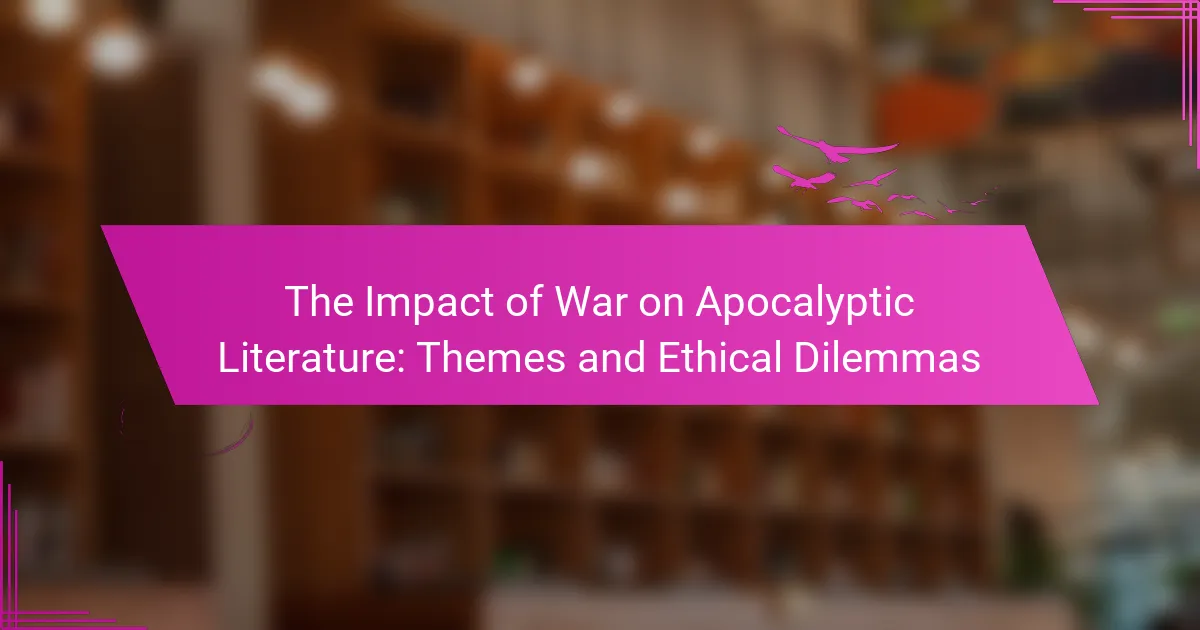War profoundly influences apocalyptic literature by shaping its themes and ethical dilemmas. This article explores how narratives reflect human conflict, societal collapse, and moral choices. It examines the psychological effects of war on characters, the portrayal of dystopian societies, and notable works that illustrate these themes. The intersection of war and apocalyptic narratives prompts a critical reflection on humanity’s resilience and vulnerability in times of crisis.
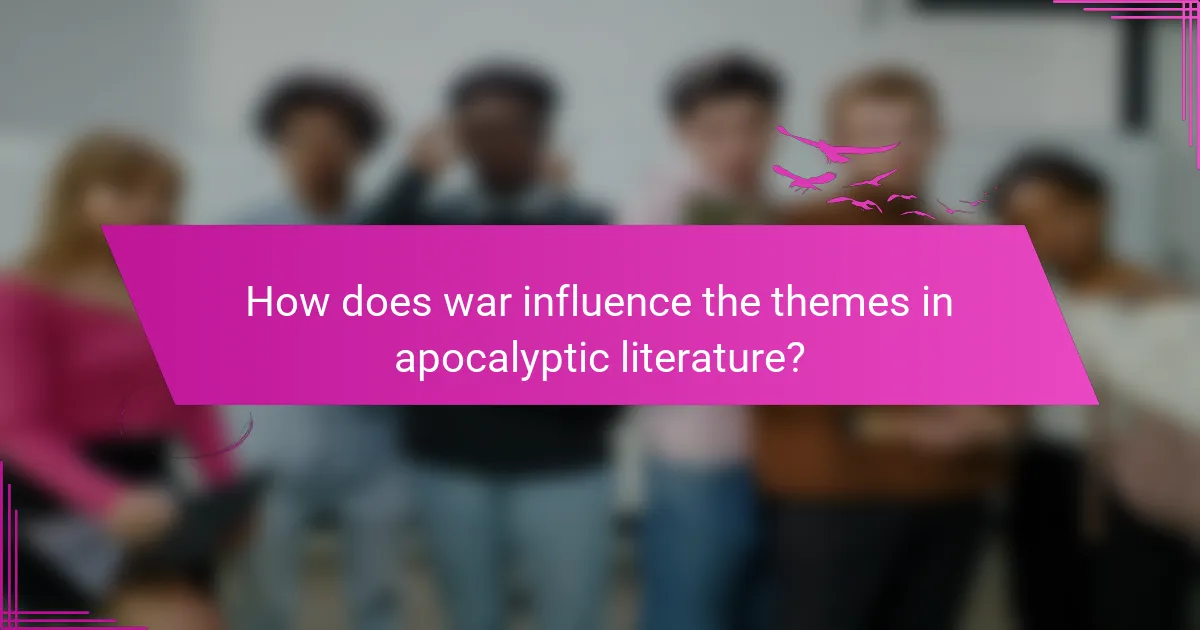
How does war influence the themes in apocalyptic literature?
War significantly shapes the themes in apocalyptic literature by highlighting human conflict, ethical dilemmas, and societal collapse. The horrors of war often serve as a backdrop for exploring the fragility of civilization and the moral choices individuals face in dire situations. Authors use war to illustrate the breakdown of societal norms, reflecting on themes of survival, sacrifice, and the quest for meaning amidst chaos. For instance, narratives may depict characters grappling with the consequences of their actions, showcasing the ethical dilemmas that arise in a war-torn world. This intersection of war and apocalyptic themes creates a powerful commentary on the human condition and the potential for both destruction and redemption.
What common themes emerge in apocalyptic narratives during wartime?
Common themes in apocalyptic narratives during wartime include survival, moral ambiguity, and the breakdown of societal norms. These narratives often reflect the chaos and destruction of war, emphasizing the struggle for survival amid conflict. Characters frequently face ethical dilemmas, questioning their values and decisions in extreme circumstances. The portrayal of humanity’s darker aspects emerges, showcasing both resilience and despair. As a result, these themes resonate deeply with readers, drawing parallels between fictional apocalypses and real-world conflicts.
How do different cultures portray war in their apocalyptic literature?
Different cultures portray war in apocalyptic literature as a catalyst for moral reflection and societal critique. In many narratives, war symbolizes the ultimate failure of humanity, often leading to catastrophic consequences. For instance, in Western literature, themes of redemption and judgment frequently emerge, while Eastern texts may emphasize the cyclical nature of destruction and rebirth.
The ethical dilemmas presented often explore the justification of violence and the human cost of conflict. Characters grapple with their roles in warfare, questioning loyalty and sacrifice. This internal struggle highlights a unique attribute of apocalyptic literature: its ability to challenge readers’ perceptions of morality in extreme situations.
Cultural contexts shape these portrayals significantly. For example, in Middle Eastern literature, war may be depicted as a divine test, reflecting historical and religious narratives. Conversely, in post-colonial literature, war often critiques imperialism and its lasting impacts on societies.
Ultimately, the impact of war on apocalyptic literature reveals deep-rooted anxieties about human nature and the future, making it a rich field for exploration across various cultural lenses.
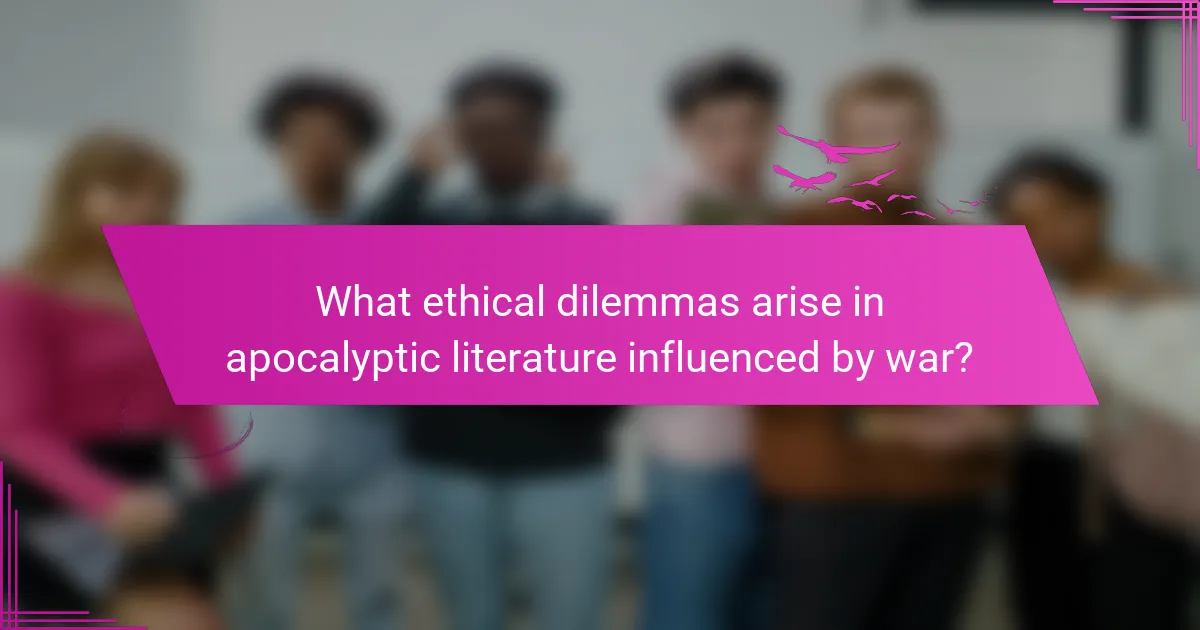
What ethical dilemmas arise in apocalyptic literature influenced by war?
War influences apocalyptic literature by presenting profound ethical dilemmas. These dilemmas often center on survival, morality, and the consequences of human actions. Characters face choices that question the value of life, the justification of violence, and the implications of sacrificing one for the many. Themes of betrayal and loyalty emerge, challenging the reader’s perception of good versus evil. The portrayal of dystopian societies raises questions about justice and redemption, highlighting the fragility of human ethics in extreme circumstances.
How do authors address the morality of survival in war-torn scenarios?
Authors often explore the morality of survival in war-torn scenarios by depicting complex ethical dilemmas. They highlight the struggle between self-preservation and the moral implications of one’s actions. Characters frequently face choices that challenge their humanity, such as sacrificing others for personal safety or forming alliances based on necessity rather than trust. This tension reflects the unique attribute of apocalyptic literature, where survival often leads to moral ambiguity. The narratives serve as a critique of human nature under extreme conditions, prompting readers to consider the rare instances where compassion can emerge amidst chaos.
What role does sacrifice play in the ethical frameworks of apocalyptic stories?
Sacrifice plays a crucial role in the ethical frameworks of apocalyptic stories by highlighting moral dilemmas. Characters often face choices between personal survival and the greater good, revealing their values and principles. This theme emphasizes the cost of survival in extreme circumstances, reflecting real-world ethical challenges. Such narratives prompt readers to consider the implications of sacrifice, shaping their understanding of morality in dire situations.
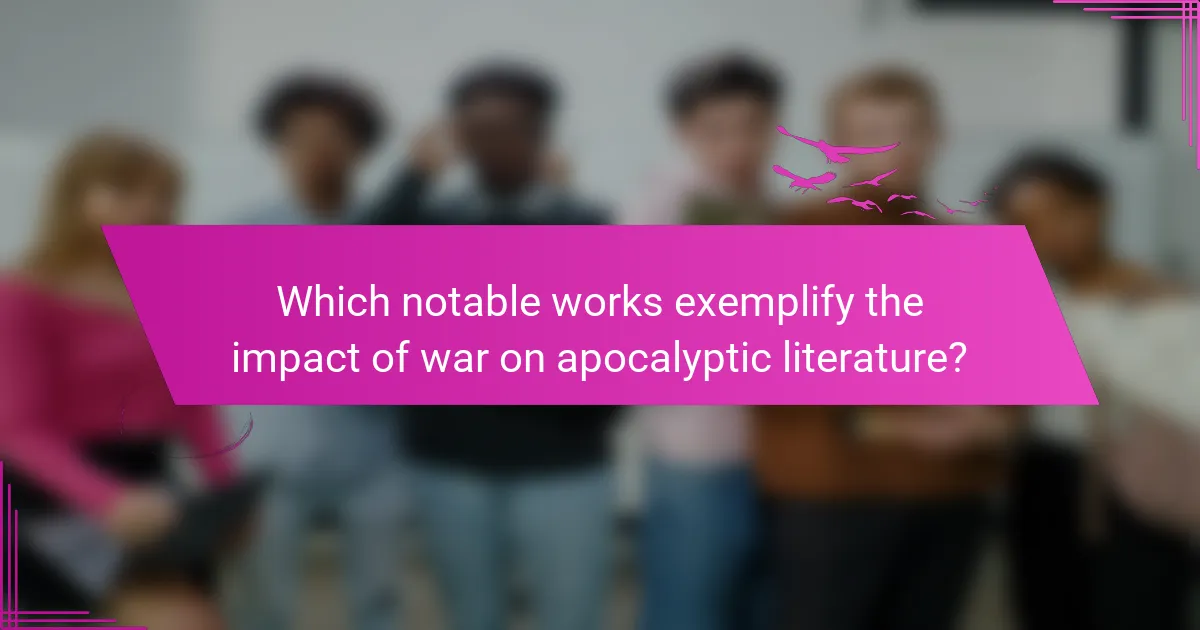
Which notable works exemplify the impact of war on apocalyptic literature?
Notable works that exemplify the impact of war on apocalyptic literature include “The Road” by Cormac McCarthy and “A Canticle for Leibowitz” by Walter M. Miller Jr. Both texts explore themes of destruction, survival, and ethical dilemmas arising from conflict. “The Road” portrays a bleak landscape shaped by an unspecified catastrophe, emphasizing human resilience amid despair. In contrast, “A Canticle for Leibowitz” examines the cyclical nature of history and the moral implications of knowledge in a post-apocalyptic world. These works illustrate how war influences narrative structures and thematic depth in apocalyptic literature.
How does “The Road” reflect the consequences of conflict?
“The Road” illustrates the dire consequences of conflict through themes of survival, loss, and moral ambiguity. The narrative depicts a post-apocalyptic world where the aftermath of war has obliterated civilization and stripped away humanity. Characters face ethical dilemmas, highlighting the struggle between maintaining moral integrity and the instinct for survival. The desolate landscape serves as a powerful metaphor for the devastation caused by conflict, reflecting the loss of hope and the fragility of human connections in dire circumstances. As a result, the story emphasizes the profound impact of war on both individuals and society.
What insights does “Station Eleven” provide on societal collapse due to war?
“Station Eleven” illustrates that war leads to societal collapse by highlighting the fragility of civilization and the importance of human connections. The narrative reveals how conflict disrupts social structures and creates ethical dilemmas, such as survival versus morality. Characters face choices that reflect the struggle between maintaining humanity and the instinct for self-preservation. The book emphasizes the lasting impact of trauma and the necessity of art and culture in rebuilding society after devastation. These themes resonate deeply, showcasing the complexities of human behavior in the face of catastrophic events.
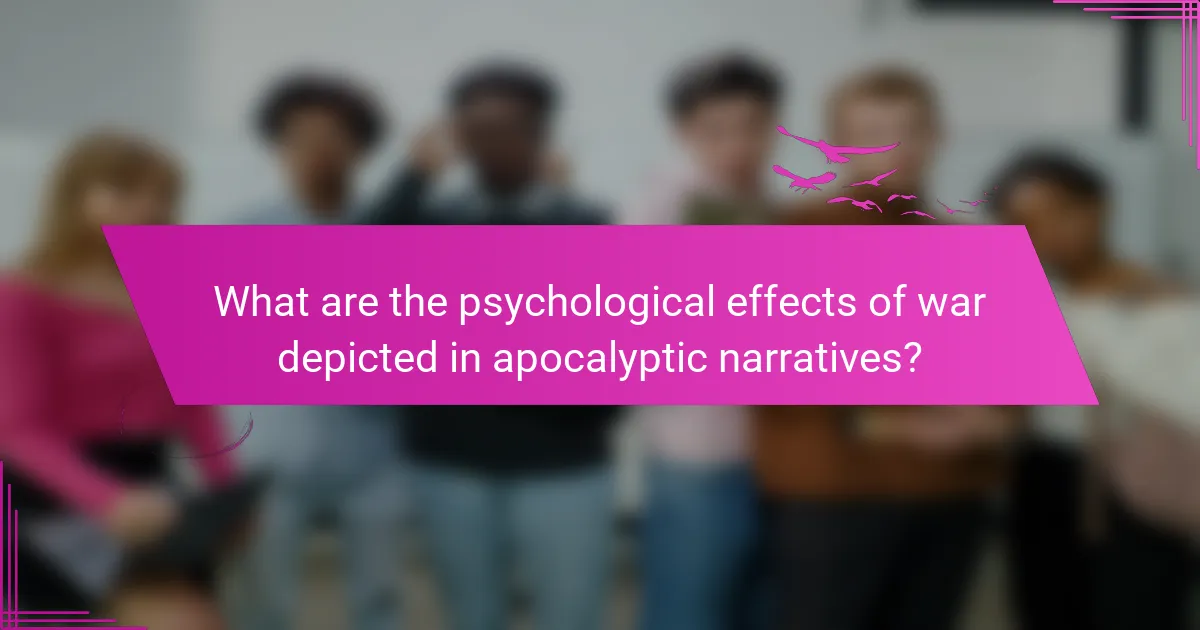
What are the psychological effects of war depicted in apocalyptic narratives?
War significantly shapes apocalyptic narratives by exploring themes of trauma, loss, and ethical dilemmas. These stories often depict psychological effects such as fear, paranoia, and existential despair. Characters grapple with moral choices in dire situations, reflecting the chaos and uncertainty of war. The unique attribute of these narratives lies in their ability to illustrate the human psyche’s resilience amid destruction. As a result, they serve as a powerful commentary on the consequences of conflict, revealing deeper truths about humanity’s struggle for survival.
How do characters cope with trauma in these literary works?
Characters in apocalyptic literature cope with trauma through various mechanisms, including resilience, denial, and the search for meaning. Many characters exhibit post-traumatic growth, transforming their experiences into sources of strength. Others may resort to escapism or violence as coping strategies. The ethical dilemmas faced often highlight their struggles, revealing how trauma impacts moral decision-making. Themes of survival and human connection emerge as essential for healing, illustrating the complex interplay between trauma and resilience in these narratives.
What narrative techniques are used to convey psychological distress?
Narrative techniques such as stream of consciousness, unreliable narration, and fragmented storytelling effectively convey psychological distress in apocalyptic literature. These methods immerse readers in characters’ tumultuous inner worlds, reflecting the chaos of war and its ethical dilemmas. Stream of consciousness allows a direct insight into a character’s thoughts, revealing their anxiety and confusion. Unreliable narration creates doubt about the character’s perceptions, mirroring the instability of their mental state. Fragmented storytelling emphasizes disconnection and trauma, highlighting the impact of war on the psyche.
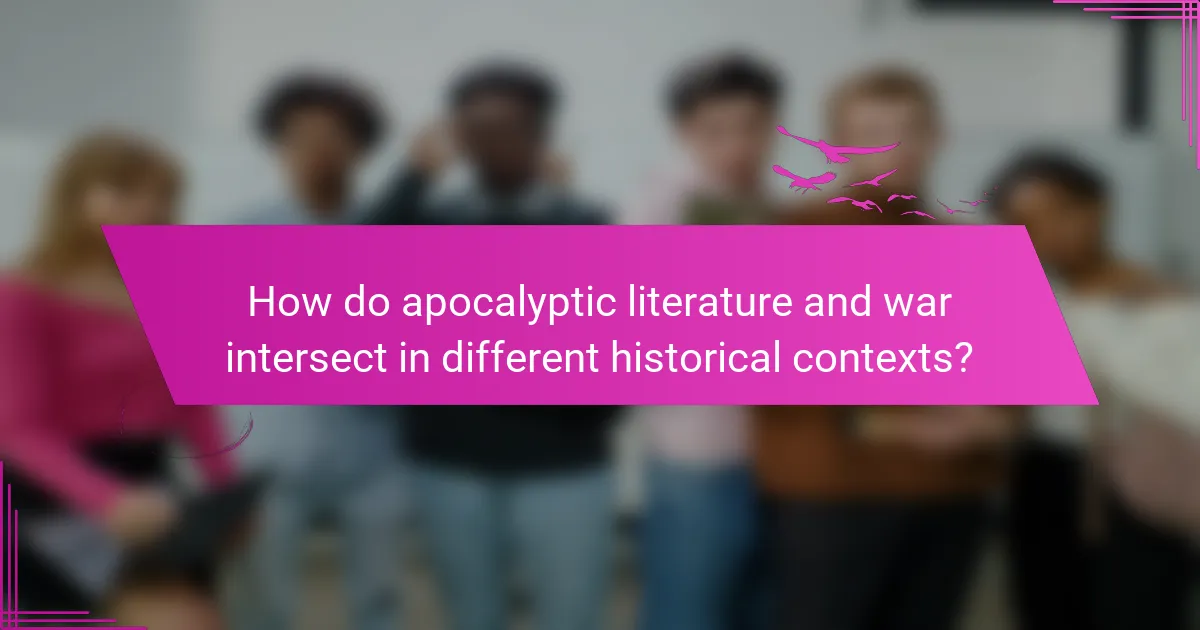
How do apocalyptic literature and war intersect in different historical contexts?
War significantly influences apocalyptic literature by shaping its themes and ethical dilemmas across historical contexts. The horrors of conflict often inspire narratives that explore human suffering, moral choices, and existential threats. For instance, during World War I, writers like T.S. Eliot reflected on despair and disillusionment, embedding these sentiments in their works.
The ethical dilemmas presented in apocalyptic literature frequently mirror the moral complexities faced during wartime. Characters grapple with decisions that reflect societal values, such as sacrifice, survival, and the nature of evil. This intersection highlights how war acts as a catalyst for profound reflection on humanity’s fate.
Historically, different cultures have responded to war through their apocalyptic narratives. In ancient texts, such as the Book of Revelation, war is depicted as a precursor to divine judgment, illustrating a unique attribute of hope amidst chaos. In contrast, modern interpretations often focus on the futility of conflict, showcasing a rare attribute that critiques the cycle of violence.
Overall, the relationship between war and apocalyptic literature reveals a dynamic interplay of themes that resonate across time, prompting readers to confront ethical dilemmas rooted in their own historical contexts.
What impact did World War II have on apocalyptic storytelling?
World War II significantly influenced apocalyptic storytelling by highlighting themes of destruction and moral ambiguity. The war’s unprecedented violence and loss of life prompted authors to explore existential crises and societal collapse. This period saw a rise in narratives depicting dystopian futures, reflecting fears of nuclear annihilation and totalitarian regimes. Writers like George Orwell and Aldous Huxley addressed ethical dilemmas surrounding human nature and governance, shaping the genre’s evolution. As a result, the war’s impact on literature continues to resonate, illustrating humanity’s struggle with hope and despair in the face of catastrophe.
How has contemporary warfare shaped modern apocalyptic narratives?
Contemporary warfare has significantly influenced modern apocalyptic narratives by highlighting ethical dilemmas and existential threats. Themes of destruction, survival, and moral ambiguity are prevalent in literature, reflecting societal anxieties. War’s immediacy shapes narratives that explore the consequences of conflict, often portraying a world on the brink of collapse. This connection fosters a unique attribute in apocalyptic literature, where the realities of warfare intertwine with speculative futures, creating a profound commentary on human nature and resilience.
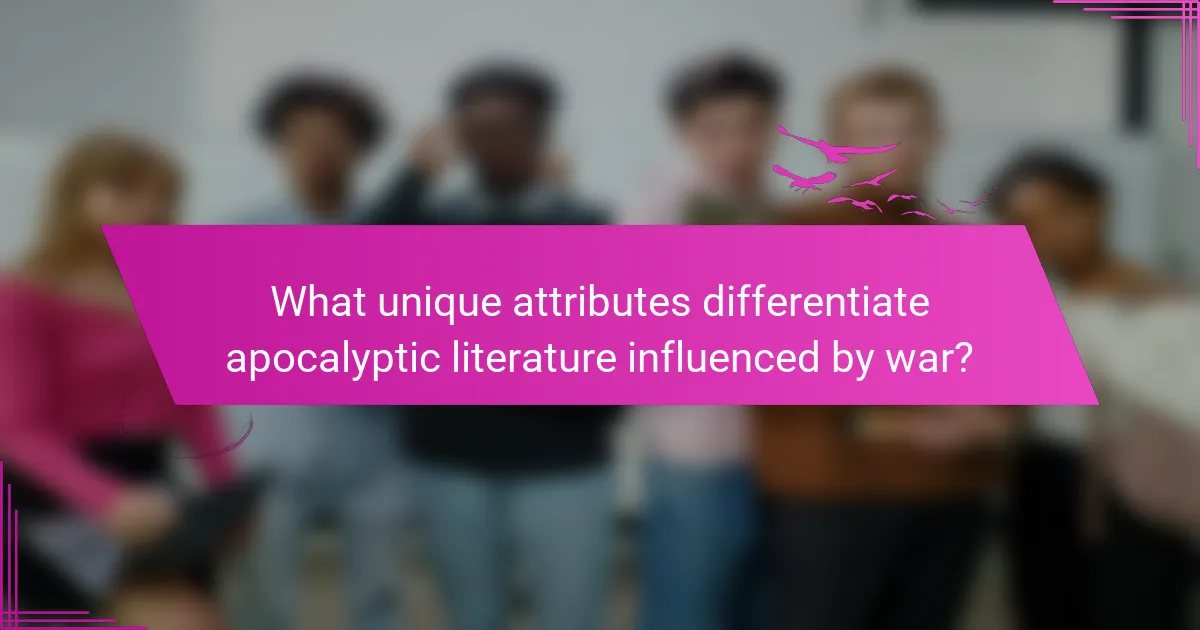
What unique attributes differentiate apocalyptic literature influenced by war?
Apocalyptic literature influenced by war often features unique attributes such as heightened moral ambiguity, the exploration of human resilience, and the portrayal of societal collapse. These themes reflect the psychological and ethical dilemmas faced during wartime, emphasizing the fragility of civilization. Additionally, the imagery of destruction and rebirth is prevalent, showcasing the duality of despair and hope. The narrative often critiques power structures, revealing the impact of conflict on humanity’s future.
How do specific regional conflicts shape the narrative styles of apocalyptic works?
Specific regional conflicts significantly influence the narrative styles of apocalyptic works by reflecting societal fears and ethical dilemmas. For instance, literature emerging from war-torn regions often emphasizes themes of survival and moral ambiguity. The portrayal of destruction and human suffering in these narratives can evoke a sense of urgency and realism that resonates with contemporary audiences.
Additionally, the unique attributes of specific conflicts shape character development and plot progression. In regions experiencing ongoing violence, protagonists may grapple with complex moral choices, highlighting the ethical dilemmas faced in dire circumstances. As a result, these narratives often serve as a critique of war and its impact on humanity.
Moreover, the rare attributes of regional histories can introduce distinct cultural perspectives into apocalyptic literature. This diversity enriches the genre, allowing for varied interpretations of hope, despair, and resilience. Such narratives not only entertain but also provoke thought on the consequences of conflict and the human condition.
What rare perspectives are offered by marginalized voices in apocalyptic literature?
Marginalized voices in apocalyptic literature offer unique perspectives that challenge dominant narratives. They often explore themes of survival, resilience, and ethical dilemmas faced by communities in crisis. These voices highlight the intersectionality of identity, emphasizing how race, gender, and socioeconomic status shape experiences in dystopian settings. For instance, narratives from indigenous authors may critique colonialism and environmental destruction, providing a rare insight into the impact of war on both culture and land. Such perspectives enrich the genre, prompting readers to reconsider traditional themes and engage with diverse ethical questions.
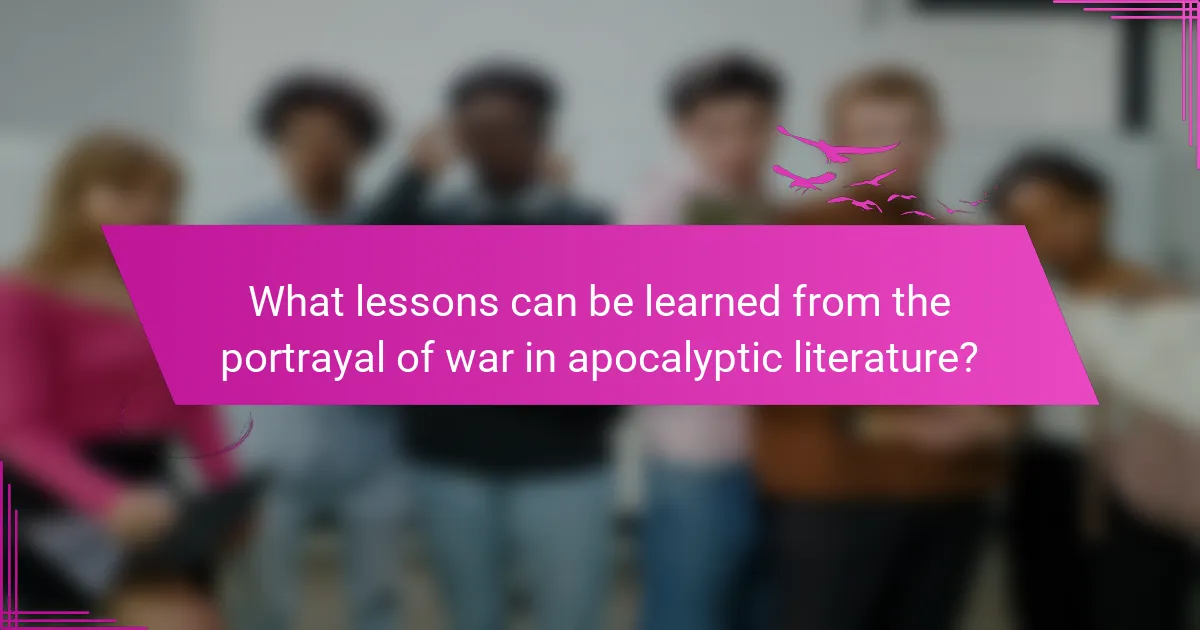
What lessons can be learned from the portrayal of war in apocalyptic literature?
The portrayal of war in apocalyptic literature teaches profound lessons about human nature and ethical dilemmas. It emphasizes the fragility of civilization and the consequences of conflict. Themes such as survival, moral ambiguity, and the loss of humanity emerge prominently. These narratives often reflect societal fears and the potential for self-destruction, urging readers to confront their own values and choices in times of crisis. Through these stories, the complexities of war are examined, revealing both the resilience and vulnerability of individuals and societies.
How can these narratives inform our understanding of current global conflicts?
Apocalyptic literature often reflects the ethical dilemmas and human experiences shaped by war. These narratives provide insight into the moral complexities and societal impacts of conflict, revealing how fear and hope coexist in turbulent times. For instance, themes of survival and redemption emerge, illustrating humanity’s resilience amidst destruction. Such literature can inform our understanding of current global conflicts by highlighting recurring patterns of behavior, the struggle for power, and the quest for meaning in chaos. This reflection fosters deeper empathy and awareness of the consequences of war on individuals and communities.
What best practices should writers consider when exploring war themes in apocalyptic contexts?
Writers should prioritize authenticity, character development, and moral complexity when exploring war themes in apocalyptic contexts. Authenticity ensures realistic portrayals of conflict’s impact on society. Strong character development fosters empathy, allowing readers to connect with diverse experiences. Additionally, addressing moral dilemmas challenges readers to reflect on ethical choices amidst chaos, enhancing the narrative’s depth.
